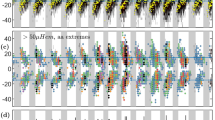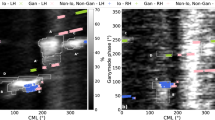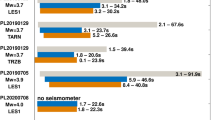Abstract
‘SUDDEN commencements’ which appear in magnetogram traces have been recognized in the past more or less by their similarity to accepted typical movements, and the ‘normal’ s.c. has been subdivided into two types according as the main movement is preceded by a smaller movement in the opposite direction or not. In the paper on ‘sudden commencements’ by H. W. Newton1 in 1948, the second type was regarded as one showing the preliminary movement in all three traces, though in the later analysis it was shown that the initial movement or ‘tail’ might take place in one element only, such as H or D. The frequency in which the tail movement was observable in D and not in H was slightly greater than vice versa.
This is a preview of subscription content, access via your institution
Access options
Subscribe to this journal
Receive 51 print issues and online access
$199.00 per year
only $3.90 per issue
Buy this article
- Purchase on Springer Link
- Instant access to full article PDF
Prices may be subject to local taxes which are calculated during checkout
Similar content being viewed by others
References
Mon. Not. Roy. Ast. Soc., Geophys. Supp., 5, 159, (1948).
Nature, 165, 243 (1950).
Author information
Authors and Affiliations
Rights and permissions
About this article
Cite this article
JACKSON, W. ‘Sudden Commencements’ in Geomagnetism. Nature 166, 691–692 (1950). https://doi.org/10.1038/166691a0
Issue Date:
DOI: https://doi.org/10.1038/166691a0
This article is cited by
Comments
By submitting a comment you agree to abide by our Terms and Community Guidelines. If you find something abusive or that does not comply with our terms or guidelines please flag it as inappropriate.



